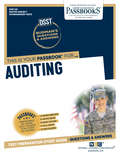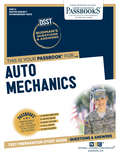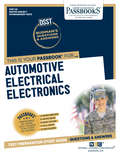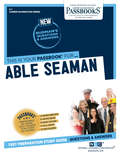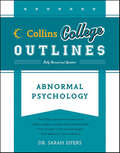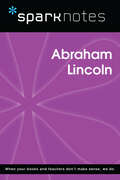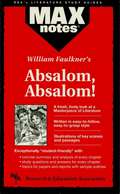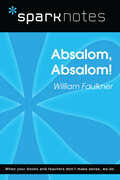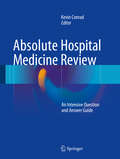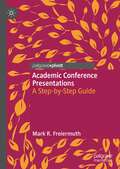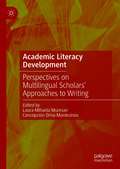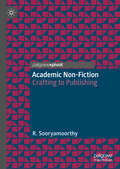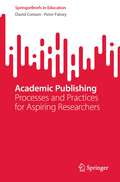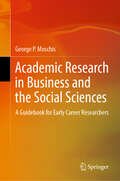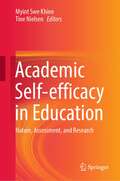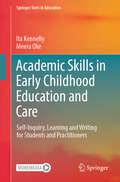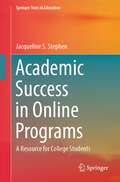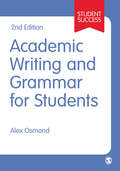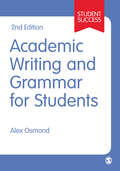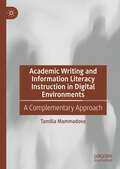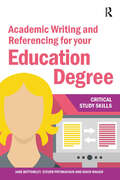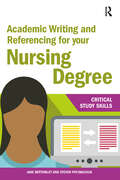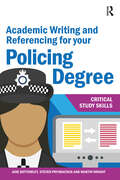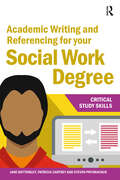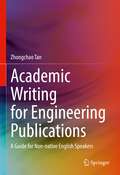- Table View
- List View
AUDITING: Passbooks Study Guide (DANTES Subject Standardized Tests (DSST) #C-2009)
by National Learning CorporationThe DSST Subject Standardized Tests are comprehensive college and graduate level examinations given by the Armed Forces, colleges and graduate schools. These exams enable students to earn college credit for what they have learned through self-study, on the job, or by other non-traditional means. The DSST Auditing Passbook® prepares candidates for the DSST exam, which enables schools to award credit for knowledge acquired outside the normal classroom environment. It provides a series of informational texts as well as hundreds of questions and answers in the areas that will likely be covered on your upcoming exam.
AUTO MECHANICS: Passbooks Study Guide (DANTES Subject Standardized Tests (DSST) #No. Q-12)
by National Learning CorporationThe DSST Subject Standardized Tests are comprehensive college and graduate level examinations given by the Armed Forces, colleges and graduate schools. These exams enable students to earn college credit for what they have learned through self-study, on the job, or by other non-traditional means. The DSST Auto Mechanics Passbook® prepares candidates for the DSST exam, which enables schools to award credit for knowledge acquired outside the normal classroom environment. It provides a series of informational texts as well as hundreds of questions and answers in the areas that will likely be covered on your upcoming exam.
AUTOMOTIVE ELECTRICAL/ELECTRONICS: Passbooks Study Guide (DANTES Subject Standardized Tests (DSST) #Dantes 39)
by National Learning CorporationThe DSST Subject Standardized Tests are comprehensive college and graduate level examinations given by the Armed Forces, colleges and graduate schools. These exams enable students to earn college credit for what they have learned through self-study, on the job, or by other non-traditional means. The DSST Automotive Electrical/Electronics Passbook® prepares candidates for the DSST exam, which enables schools to award credit for knowledge acquired outside the normal classroom environment. It provides a series of informational texts as well as hundreds of questions and answers in the areas that will likely be covered on your upcoming exam.
Able Seaman: Passbooks Study Guide (Career Examination Series #C-1)
by National Learning CorporationThe Able Seaman Passbook® prepares you for your test by allowing you to take practice exams in the subjects you need to study. It provides hundreds of questions and answers in the areas that will likely be covered on your upcoming exam, including but not limited to: basic seamanship, including operation and maintenance of vessels; ropes and knots; first aid; and more.
Abnormal Psychology (Collins College Outlines)
by Sarah SifersThe Collins College Outline for Abnormal Psychology examines the symptoms, causes, and common treatments of the most frequently noted disorders, including personality, mood, psychotic, anxiety, gender, and organic conditions. This comprehensive guide also provides essential information on the history of abnormal psychology, legal issues, social policies, and major advances in research, as well as detailed explanations of behavioral, cognitive, biogenic, and sociocultural perspectives. Completely revised and updated byDr. Sarah Sifers, this book includes a test yourself section with answers and complete explanations at the end of each chapter. Also included are bibliographies for further reading, as well as numerous graphs, charts, and examples.The Collins College Outlines are a completely revised, in-depth series of study guides for all areas of study, including the Humanities, Social Sciences, Mathematics, Science, Language, History, and Business. Featuring the most up-to-date information, each book is written by a seasoned professor in the field and focuses on a simplified and general overview of the subject for college students and, where appropriate, Advanced Placement students. Each Collins College Outline is fully integrated with the major curriculum for its subject and is a perfect supplement for any standard textbook.
Abraham Lincoln (SparkNotes Biography Guide)
by SparkNotesAbraham Lincoln (SparkNotes Biography Guide) Making the reading experience fun! SparkNotes Biography Guides examine the lives of historical luminaries, from Alexander the Great to Virginia Woolf. Each biography guide includes:An examination of the historical context in which the person livedA summary of the person&’s life and achievementsA glossary of important terms, people, and eventsAn in-depth look at the key epochs in the person&’s careerStudy questions and essay topicsA review testSuggestions for further readingWhether you&’re a student of history or just a student cramming for a history exam, SparkNotes Biography guides are a reliable, thorough, and readable resource.
Absalom, Absalom! (MAXNotes Literature Guides)
by Carol JohnsonREA's MAXnotes for William Faulkner's Absalom, Absalom! MAXnotes offer a fresh look at masterpieces of literature, presented in a lively and interesting fashion. Written by literary experts who currently teach the subject, MAXnotes will enhance your understanding and enjoyment of the work. MAXnotes are designed to stimulate independent thought about the literary work by raising various issues and thought-provoking ideas and questions. MAXnotes cover the essentials of what one should know about each work, including an overall summary, character lists, an explanation and discussion of the plot, the work's historical context, illustrations to convey the mood of the work, and a biography of the author. Each chapter is individually summarized and analyzed, and has study questions and answers.
Absalom, Absalom! (SparkNotes Literature Guide Series)
by SparkNotesAbsalom, Absalom! (SparkNotes Literature Guide) by William Faulkner Making the reading experience fun!Created by Harvard students for students everywhere, SparkNotes is a new breed of study guide: smarter, better, faster.Geared to what today's students need to know, SparkNotes provides:chapter-by-chapter analysisexplanations of key themes, motifs, and symbolsa review quiz and essay topicsLively and accessible, these guides are perfect for late-night studying and writing papers.
Absolute Hospital Medicine Review: An Intensive Question & Answer Guide
by Kevin ConradHospital medicine has expanded beyond the practice of internal medicine to co-manage patients in the fields of orthopedics, neurosurgery and general surgery. This concise guide covers the evolution and expanding scope of hospital medicine and the variety of clinical, ethical and administrative situations a Hospitalist encounters. 500 questions on inpatient care, co-management of patients and hospital system management are provided with the goal of assessing clinical and academic competency. Questions feature actual cases with evidence-based solutions. Useful to physicians, house staff and advanced nurse practitioners, this up-to-date referenced learning text encompasses all aspects of hospital care.
Academic Conference Presentations: A Step-by-Step Guide
by Mark R. FreiermuthThis book provides a step-by-step journey to giving a successful academic conference presentation, taking readers through all of the potential steps along the way—from the initial idea and the abstract submission all the way up to the presentation itself. Drawing on the author's own experiences, the book highlights good and bad practices while explaining each introduced feature in a very accessible style. It provides tips on a wide range of issues such as writing up an abstract, choosing the right conference, negotiating group presentations, giving a poster presentation, what to include in a good presentation, conference proceedings and presenting at virtual or hybrid events. This book will be of particular interest to graduate students, early-career researchers and non-native speakers of English, as well as students and scholars who are interested in English for Academic Purposes, Applied Linguistics, Communication Studies and generally speaking, most of the Social Sciences. With that said, because of the book’s theme, many of the principles included within will appeal to broad spectrum of academic disciplines.
Academic Literacy Development: Perspectives on Multilingual Scholars' Approaches to Writing
by Laura-Mihaela Muresan Concepción Orna-MontesinosThis edited book brings together an international cast of contributors to examine how academic literacy is learned and mastered in different tertiary education settings around the world. Bringing to the fore the value of qualitative enquiry through ethnographic methods, the authors illustrate in-depth descriptions of genre knowledge and academic literacy development in first and second language writing. All of the data presented in the chapters are original, as well as innovative in the field in terms of content and scope, and thought-provoking regarding theoretical, methodological and educational approaches. The contributions are also representative of both novice and advanced academic writing experiences, providing further insights into different stages of academic literacy development throughout the career-span of a researcher. Set against the backdrop of internationalisation trends in Higher Education and the pressure on multilingual academics to publish their research outcomes in English, this volume will be of use to academics and practitioners interested in the fields of Languages for Academic Purposes, Applied Linguistics, Literacy Skills, Genre Analysis and Acquisition and Language Education.
Academic Non-Fiction: Crafting to Publishing
by R. SooryamoorthyThis book offers comprehensive directions to crafting academic nonfiction that is both rigorous and captivating, filling a critical gap in the genre. While academic nonfiction plays a vital role in fostering knowledge-based societies and driving economic growth, there has long been a need for a resource that helps authors create works that are as engaging as they are informative. Designed for both aspiring and established writers, this book provides practical advice and innovative techniques to elevate nonfiction writing. It covers everything from selecting marketable topics and developing effective writing habits to managing time and navigating the complexities of the publication process. Unlike most writing guides, it emphasises how to infuse nonfiction with the allure and engagement necessary to reach a broad audience without compromising accuracy or depth. With short, digestible chapters, insider tips on proposal writing, and insights into the peer review process, this book serves as a step-by-step roadmap to transforming academic writing into compelling works. Essential for writers aiming to produce nonfiction that not only informs but also resonates with readers, this resource is an indispensable tool for creating impactful scholarly work.
Academic Publishing: Processes and Practices for Aspiring Researchers (SpringerBriefs in Education)
by David Coniam Peter FalveyThis book focuses on the topic of academic publishing. It discusses the mounting, serious problems that researchers, particularly new researchers, encounter when trying to publish their research. The book addresses the issues of publishing as well as the salient factors militating against academic publication and the mitigating factors encouraging academic publication. It provides potential solutions, suggestions, and strategies for overcoming some of these problems. Growing research output from Southeast Asia including Singapore, Malaysia, Taiwan, and China reveals the struggles that many authors have to confront when attempting to publish their work in reputable journals. In both South Africa and other parts of Africa, academic researchers are beginning to show strong evidence of credible academic output. These researchers all need valid outlets for their work and the security that authentic peer review brings to the reviewing process. In the fields of education, social sciences, and professional practices, e.g., architecture and law, recent years have seen the emergence of new outlets for practitioners’ research outputs in areas such as one’s own practice, self-reflection, and narrative inquiry. These outlets are discussed in this book. The book also discusses the malign influence of predatory publications in detail. This book will be beneficial to university academics, postgraduate students, Ph.D. supervisors, and new researchers.
Academic Research in Business and the Social Sciences: A Guidebook for Early Career Researchers
by George P. MoschisThis book provides doctoral students, junior faculty and early-career researchers with guidelines, resources and strategies for performing and publishing academic research successfully. It helps increase the productivity of researchers by showing efficient and effective ways to increase research output and publication probability, ranging from manuscript preparation and positioning to working with co-authors and journal reviewers. The author uses research findings, anecdotal evidence and illustrations from his academic career to support his views on strategies and tactics that are required of scholars in order to succeed.
Academic Self-efficacy in Education: Nature, Assessment, and Research
by Myint Swe Khine Tine NielsenThis book documents systematic, prodigious and multidisciplinary research in the nature and role of academic self-efficacy, and identifies areas for future research directions within the three sections of the book: 'Assessment and Measurement of Academic Self-efficacy', 'Empirical Studies on What Shapes Academic Self-efficacy', and 'Empirical Studies on Influence of Academic Self-efficacy'. The book presents works by educators and researchers in the field from various parts of the world, highlighting advances, creative and unique approaches, and innovative methods. It examines discussions around the theoretical and practical aspects of academic self-efficacy in culturally and linguistically-diverse educational contexts. This book also showcases work based on classical and modern test theory methods, mediation and moderation analysis, multi-level modelling approaches, and qualitative analyses.
Academic Skills in Early Childhood Education and Care: Self-Inquiry, Learning and Writing for Students and Practitioners (Springer Texts in Education)
by Ita Kennelly Meera OkeThis book supports the development of academic, personal, and professional skills for students of Early Childhood Education and Care (ECEC). It aims to demystify aspects of learning and writing practices and can be used by students as a practical resource to enhance their engagement with education and to support their success on their programmes. The book guides students in a range of areas to help their academic development including study techniques, time management, managing groupwork, understanding assessment requirements, academic writing and how to work effectively within a digital learning environment. In addition, the book features a strong personal and professional development dimension which enables readers to engage in a process of self-inquiry as part of their learning. This self-inquiry is important to understanding assumptions about learning and can help students to explore their prior educational experiences and to identify their particular motivations and challenges. The book extends this self-inquiry to support the development of reflective practice which is key to enhancing students' learning and to enabling the ongoing professional development and practice of the ECEC educator. While many ECEC undergraduate programmes offer academic guidance to students, there is a gap for a more embedded academic support which is discipline specific and therefore more closely attuned to the needs of the ECEC student and the emerging needs of the sector. In addition to providing a resource for students and practitioners, this book can also serve as a useful resource for lecturers in the ECEC discipline. Its accompanying site contains downloadable templates from the book which provide a range of activities and prompts suitable for engaging students in thinking about their learning and writing about their professional practice.
Academic Success in Online Programs: A Resource for College Students (Springer Texts in Education)
by Jacqueline S. StephenThis book provides higher education students with a comprehensive resource to assist them in their academic persistence in an online course or program. It addresses a wide selection of topics emphasizing a myriad of factors that impact a student’s persistence, and ultimate success, in an online program or course. The book helps students to gain insight into the skills, knowledge, and attributes needed to succeed in the autonomous nature of an online learning environment. Thus, this book helps students to proactively engage in activities to prepare for online learning. Information presented in each chapter is drawn from theory and recent research centered on persistence of online students in higher education. It incorporates hands-on practical activities to promote application of theory and research, and encourages students to demonstrate their knowledge, skills, and abilities through the use of reflective and thought-provoking activities. Hence, this book provides online students with an up-to-date resource they can use to develop an awareness of their readiness and preparedness for online learning. Additionally, this book equips students with information and strategies aimed at helping them to address gaps in their skills and knowledge that may present them with barriers to academic success. The content of this book is aligned with widely used student learning outcomes and objectives of first-year student seminar courses and orientation programs for graduate and undergraduate students enrolled in online programs. Furthermore, it is deliberately organized and structured to support an online student’s academic journey as they navigate the online learning environment. As such, these features make it an ideal book for use by students, instructors, and academic advisors or college and university academic support staff.
Academic Writing and Grammar for Students (SAGE Study Skills Series)
by Alex OsmondAvailable as an E-Inspection Copy! Go here to order Grappling with grammar? Struggling with punctuation? Whether you're writing an essay or assignment, report or dissertation, this useful guide shows you how to improve the quality of your work at university – fast – by identifying and using the correct use of English grammar and punctuation in your academic writing. Using tried and tested advice from student workshops, Alex Osmond shares practical examples that illustrate common mistakes, and shows you how to avoid them. You’ll also discover guidance on: Writing structure – the what and how of crafting sentences and paragraphs Conciseness – how to express your point succinctly and clearly, showing you understand the topic Effective proofreading – the importance of the final ‘tidy up’, so your work is ready to hand in Referencing – common systems, and how to reference consistently (and avoid plagiarism). This new edition also includes separate chapters on critical thinking and referencing, exploring each topic in more detail, and learning outcomes in every chapter, so you can identify what new skills you’ll take away. Personal tips and advice direct from Alex Osmond For access to additional resources and one-to-one advice from Alex, 'like' his Facebook page Academic Writing and Grammar for Students. SAGE Study Skills are essential study guides for students of all levels. From how to write great essays and succeeding at university, to writing your undergraduate dissertation and doing postgraduate research, SAGE Study Skills help you get the best from your time at university. Visit the SAGE Study Skills hub for tips, resources and videos on study success!
Academic Writing and Grammar for Students (SAGE Study Skills Series)
by Alex OsmondThis handy guide shows students how to use academic English grammar and punctuation. The author identifies common grammar mistakes and how to avoid them, making extensive use of examples and advice from tutors from a range of subjects. This valuable book enables readers to immediately improve their work at university.<P> Inside, you will find practical advice on:<P> * common mistakes<P> * punctuation<P> * conciseness<P> * proofreading<P> * referencing<P> * and more.<P> The advice in the book has been tried and tested through workshops that the author runs with students. It will be useful to undergraduates on a wide range of courses, and will help promote independent learning as well as practical writing skills.
Academic Writing and Information Literacy Instruction in Digital Environments: A Complementary Approach
by Tamilla MammadovaThis book offers an interdisciplinary approach to the teaching of academic writing and information literacy in a new digital dimension, drawing on recent trends towards project-based writing, digital writing and multimodal writing in Education, and synthesising theory with practice to provide a handy toolkit for teachers and researchers. The author combines a practical orientation to teaching academic writing and information literacy with a grounding in current theories of writing instruction in the digitalized era, and argue that as digital environments become more universal in modern society - particularly in the aftermath of the coronavirus pandemic - the lines between traditional academic writing and multi-modal digital writing must necessary become blurred. This book will be of use to teachers and instructors of academic writing and information literacy, particularly within the context of English for Academic Purposes (EAP), as well as students and researchers in Applied Linguistics, Pedagogy and Digital Writing.
Academic Writing and Referencing for your Education Degree (Critical Study Skills)
by David Waugh Jane Bottomley Steven PryjmachukIf you are embarking on a university-based education degree, including initial teacher training, the books in this series will help you acquire and develop the knowledge, skills and strategies you need to achieve your goals. They provide support in all areas important for university study, including institutional and disciplinary policy and practice, self-management, and research and communication. Tasks and activities are designed to foster aspects of learning which are valued in higher education, including learner autonomy and critical thinking, and to guide you towards reflective practice in your study and work life.Academic Writing and Referencing for your Education Degree provides you with a sound knowledge and understanding of: what constitutes good academic writing in education a range of strategies for writing successful essays and reports the importance of clarity and coherence in your writing about education how to improve your academic style, grammar and punctuation, and formatting and presentation referencing conventions in the field of education, and of how to avoid plagiarism.
Academic Writing and Referencing for your Nursing Degree (Critical Study Skills)
by Jane Bottomley Steven PryjmachukInvaluable jargon-free guide for anyone doing a nursing degree, providing study support and helping you to improve your academic writing and referencing skills.Academic Writing and Referencing for your Nursing Degree provides you with a sound knowledge and understanding of: what constitutes good academic writing in nursing a range of strategies for writing successful essays and reports the importance of clarity and coherence in your writing about nursing how to improve your academic style, grammar and punctuation, and formatting and presentation referencing conventions in the field of nursing, and of how to avoid plagiarism. If you are embarking on a university nursing degree, the books in our Critical Study Skills for Nursing series will help you acquire and develop the knowledge, skills and strategies you need to achieve your goals. They provide support in all areas important for university study, including institutional and disciplinary policy and practice, self-management, and research and communication. Tasks and activities are designed to foster aspects of learning which are valued in higher education, including learner autonomy and critical thinking, and to guide you towards reflective practice in your study and work life.
Academic Writing and Referencing for your Policing Degree (Critical Study Skills)
by Martin Wright Jane Bottomley Steven PryjmachukIf you are embarking on a university criminology, policing or other law enforcement professional degree, the books in this series will help you acquire and develop the knowledge, skills and strategies you need to achieve your goals. They provide support in all areas important for university study, including institutional and disciplinary policy and practice, self-management, and research and communication. Tasks and activities are designed to foster aspects of learning which are valued in higher education, including learner autonomy and critical thinking, and to guide you towards reflective practice in your study and work life.Academic Writing and Referencing for your Policing Degree provides you with a sound knowledge and understanding of: what constitutes good academic writing in policing a range of strategies for writing successful essays and reports the importance of clarity and coherence in your writing about policing how to improve your academic style, grammar and punctuation, and formatting and presentation referencing conventions in the field of policing, and of how to avoid plagiarism.
Academic Writing and Referencing for your Social Work Degree (Critical Study Skills)
by Jane Bottomley Steven Pryjmachuk Patricia CartneyIf you are embarking on a university social work degree the books in this series will help you acquire and develop the knowledge, skills and strategies you need to achieve your goals. They provide support in all areas important for university study, including institutional and disciplinary policy and practice, self-management, and research and communication. Tasks and activities are designed to foster aspects of learning which are valued in higher education, including learner autonomy and critical thinking, and to guide you towards reflective practice in your study and work life.Academic Writing and Referencing for your Social Work Degree provides you with a sound knowledge and understanding of: what constitutes good academic writing in social work a range of strategies for writing successful essays and reports the importance of clarity and coherence in your writing about education how to improve your academic style, grammar and punctuation, and formatting and presentation referencing conventions in the field of social work, and of how to avoid plagiarism.
Academic Writing for Engineering Publications: A Guide for Non-native English Speakers
by Zhongchao TanThis textbook is designed for non-native English speakers who need to write scientific and engineering research articles, technical reports, engineering thesis, academic books, and other technical documents in English. The author focuses on formal academic writing in a professional language and frame. The book is written in standard English and provides useful guidelines on development of thoughts, organization of ideas, construction of paragraphs and sentences, and choices of precise words. It also pays attention to details such as visual creation, punctuation, and format. Informal writing is excluded from the scope of this practical guideline.
